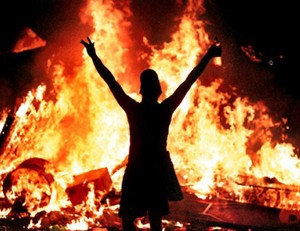by Alissa Strong
On Tuesday morning, Former President Bill Clinton appeared on CBS and issued a no-holds-barred statement to Muslim activists. Clinton condemned the tendency to resort to violence when the Islamic faith is disrespected and claimed that the modern world is too diverse, too grounded in the principles of free speech, and too connected socially on the Internet for groups to avoid being offended at one time or another.
He added, “You can’t react every time you’re insulted. . . . You cannot live in a shame-based world. You won’t make it in the twenty-first century.”
I do not claim to subscribe to all the beliefs held by Former President Clinton. I do not agree with all of his political ideas, and I do not endorse all of the actions he has taken. However, I do recognize true and good words when I hear them, and I will proudly announce my agreement with such a statement, no matter from whose lips the words came.
I believe that Former President Clinton’s words are true, not only for Muslims but for all people. We live in a world where, for the first time, Internet communication allows us to know what other people from all cultures all across the world are saying and thinking about us.
It is no longer a matter of if we will encounter disagreement and ridicule, but when.
Learning to allow others the freedom of speech and action that we desire for ourselves is part of growing up. Not that taking offense is always childish—quite the contrary. When others demean us or our innermost values and beliefs, they can cut deep into our hearts. It is our natural reaction to protect what is dearest to us. But as we grow, we must learn to protect those things appropriately.
I believe that there is a difference between protecting your beliefs and reacting violently. I come from a religion that teaches us from our youth to “stand for something or you’ll fall for anything.” Standing for what you believe in is an appropriate way of protecting what you value. It includes firmly but politely (also legally) doing what you can to uphold your beliefs in a situation where you can make a difference. Reacting violently, on the other hand, is an emotional and physical response that infringes on the rights of others and does not always have an effect except to harm those whom you have targeted. Such behavior is immature and unacceptable.
I believe that violent reactions are also ineffective. In 2002, approximately seventy Afghan refugees illegally seeking asylum in Australia sewed their lips and the lips of their children together to protest against the Australian government. The government did not react to their request and continued with their typical immigration processes.
Why?
Because if the government had granted the refugees what they wanted, future refugees would learn that self-harm to one’s self or children was likely to induce a wanted action. Behavioral psychology’s operant conditioning theory (introduced by B. F. Skinner) teaches that if a behavior is rewarded, we condition ourselves to continue that behavior in the hopes of gaining another reward. If a behavior is punished, presumably we will avoid that behavior in future to avoid future punishment. Thus, reacting to an offense with violence will likely make little to no difference to a cause because governments—or those we offend—are unlikely to acquiesce to such demands and encourage the likelihood of more violent protests in the future.
The world is changing, and not always for the better. But I believe that we can change for the better.
I believe there is strength and honor in turning the other cheek—in doing what we can to live and protect our beliefs, but also granting others the respect and courtesy to do the same.
I believe there is no honor in resorting to violence to protest when we are offended—be it physical violence or even simply bullying another via the Internet.
I believe that we have the responsibility and obligation either to solve disagreements like civilized adults—communicating clearly and rationally—or to look the other way and focus on the good that is in the world. To do any differently would defeat the purpose of standing for a greater good.



